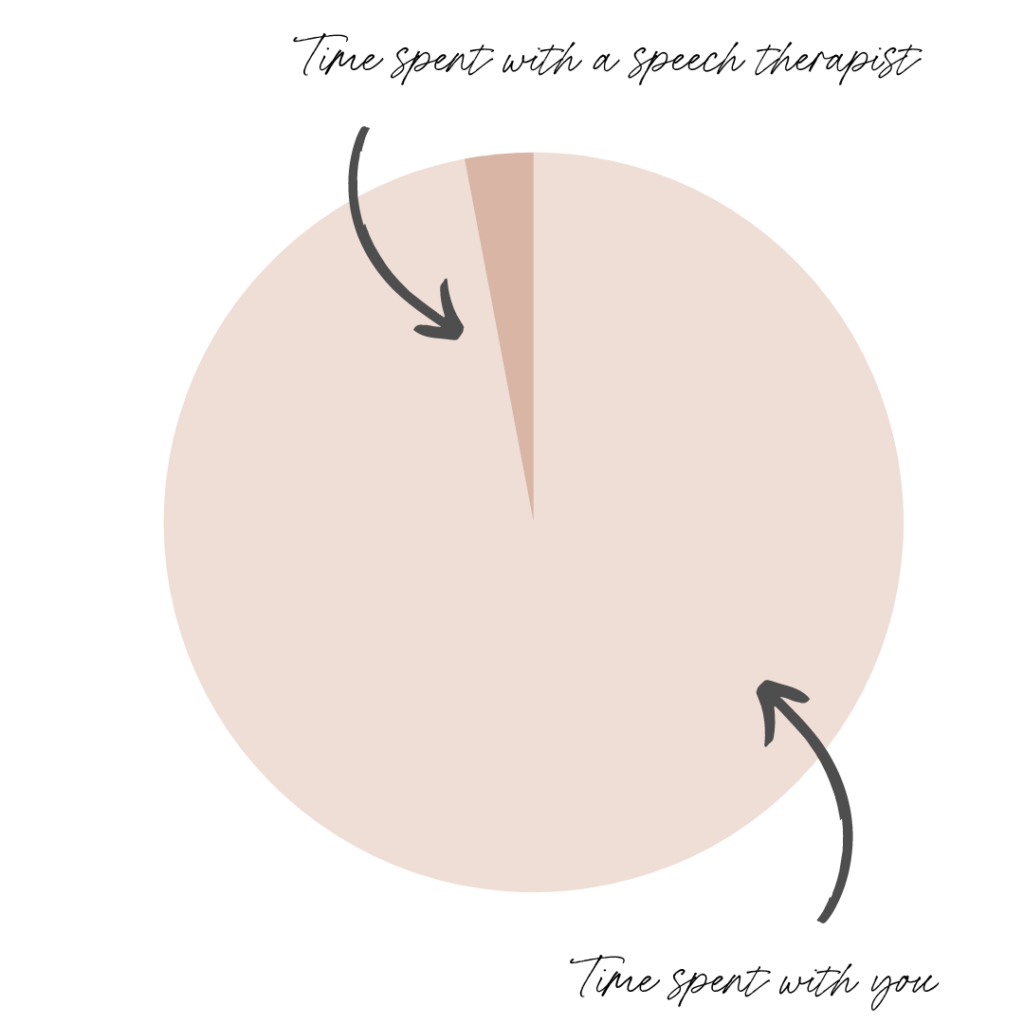
The problem with “wait and see”
Often times families with concerns about their toddler’s speech development are advised to “wait and see. ” The expectation is that within a few months, little ones will catch up on their own and the ones that don’t will then be referred for speech therapy.
But here’s the thing-after a few months have gone by, toddlers that were behind with their speech development are even further behind and what started out as small gaps can quickly become big gaps.
Won’t they grow out of it?
While many children do “grow out of it” many do not. Research shows that about 20-30% of late talking toddlers will continue to have difficulty with language. There are several “risk factors” that suggest a child is more likely to continue to struggle with language. They are: (3)
- Uses few gestures to communicate
- Uses mostly nouns (names of people, places, things), and few action words
- Difficulty playing with peers (social skills)
- Family history of communication delay, learning or academic difficulties
- Mild comprehension (understanding) delay for his or her age
- Quiet as an infant; little babbling
- History of ear infections
- Limited number of consonant sounds (p, b, m, t, d, n, y, k, g, etc.)
- Does not link pretend ideas and actions together while playing
- Does not imitate (copy) words
If your toddler isn’t using as many words as expected for their age and has any of the above factors, we recommend consulting with a speech therapist.
The sooner your toddlers gets support, the faster they can catch up
That’s why the sooner the better-the sooner your child gets support, the faster they can catch up.
When we help toddlers early on, not only does their language improve, but it also helps them develop skills that depend on language, like reading, social skills, behavior, and executive function skills like planning and organizing (4). Helping Late Talkers early on prevents academic and social difficulties later on [4].

The sooner, the better!
From 0-3, your child’s brain grows faster than it ever will again! Incredibly, your child’s brain doubles in size in the first year and keeps growing to about 80% of adult size by age three (3). Pathways in the brain develop rapidly during this time, also known as the “critical period.” These pathways lay the foundation for all future learning and behavior.
This is also when the brain is most sensitive to learning through experiences and interactions, and when we make the biggest impact! After three, most of the brain’s major pathways are mature and it becomes much harder to make significant changes.
This is why early intervention matters and why “wait and see” is not only unhelpful, but can potentially be harmful advice.
What does speech therapy for toddlers look like?
You may have realized that you spend more time with your child than a speech therapist ever could! That’s why speech therapy with toddlers focuses on showing YOU how to support your toddler’s speech development through maximizing everyday moments and turning them into opportunities for speech and language development. Research shows that when parents were trained in speech therapy strategies to support their toddler’s speech development, the toddlers responded as well as, sometimes better than, when speech therapists delivered the therapy (5). That’s why parent implemented intervention is recommended for late-talking toddlers.

The magic is in the moments
Using speech therapy strategies at home doesn’t mean setting aside extra time to “work on speech.” The magic is in the everyday moments like going for a walk or giving your child bath. It’s knowing how to make simple shifts during these daily routines and play that makes a big difference.
What if you don’t want to “wait and see”?
Learn strategies to support your child’s speech development at home: My Big Little Talkers Course will show you exactly how to use speech therapy strategies to help your child say more and get off to the best start with speech and language development.
Reach out to a speech therapist– Speech therapists are the experts on speech and language and can look closely at your child’s unique communication strengths and needs to determine if your child would benefit from speech therapy.
Reach out to Early Intervention: ECI provides services such as speech, occupational, and physical therapy to children Birth-3, sometimes as no cost to you.

References:
(1) Boaden, D. & Koohi, A. L. (2018). Strengthening Your Child’s “Control Centre”: How Bilingualism Boosts Executive Functioning. Available online: http://www.hanen.org/Helpful-Info/Articles/strengthening-childs-control.aspx.
(2) Capone Singleton, N. (2018). Late talkers: Why the wait-and-see approach is outdated. Pediatric Clinics of North America, 65(1), 13-29.
(4) Olswang, L.B., Rodriguez, B. & Timler, G. (1998). Recommending Intervention for Toddlers With Specific Language Learning Difficulties: We May Not Have All the Answers, But We Know a Lot. American Journal of Speech Language Pathology, 7, 23 – 32.
(5) Roberts, M., & Kaiser, A. (2011). The Effectiveness of Parent-Implemented Language Intervention: A Meta-Analysis. American Journal of Speech-Language Pathology, 20, 180-199






